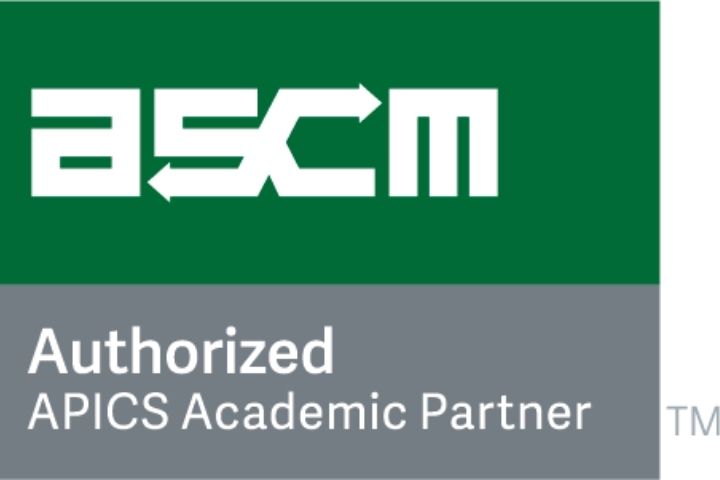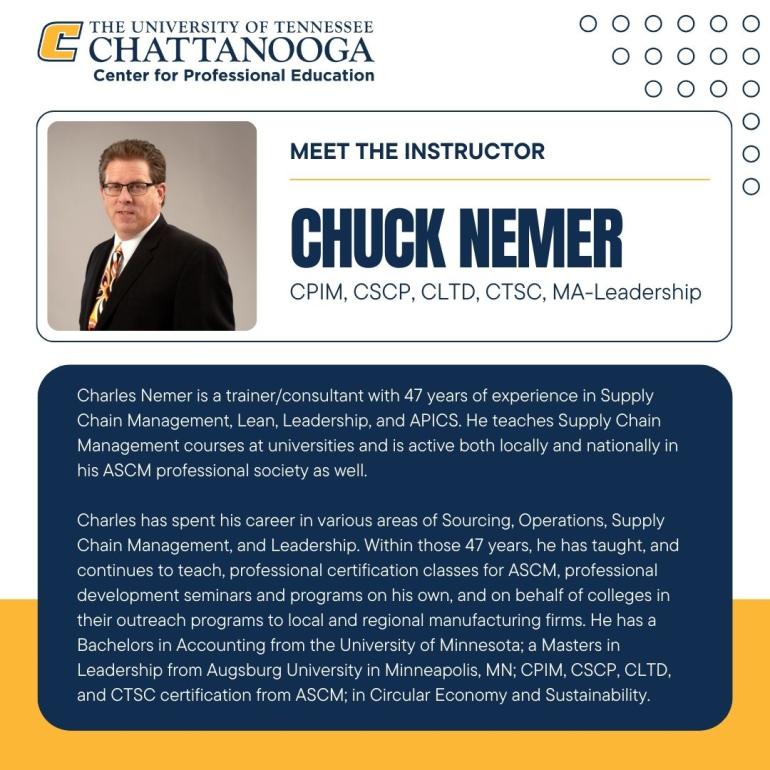CSCP Exam Prep Course
Prepare for CSCP certification and career advancement with UTC's Accelerated CSCP Boot Camp. (Live, Online)
Accelerate your path to becoming a Certified Supply Chain Professional (CSCP) with our high-impact program—designed to blend strategic, globally-recognized content with accessible learning. Our innovative modified boot camp model delivers six dynamic, instructor-led sessions alongside six flexible asynchronous modules, offering the perfect mix of expert guidance and self-paced study to help you build knowledge, leadership, and performance in supply chain operations.
UTC is excited to announce that we are now offering payment plans for this course! Visit our financial aid page to learn more.
Course At A Glance
Format
Live-Online
Length
6 Weeks
Program Hours
35 Hours
CEUs
3.5
Meeting Days and Times
Course meets virtually on Saturdays.
Course meeting dates: 2/7, 2/21, 3/7, 3/28, 4/11, 4/25
Registration closes
One week prior to the start of class.
Price
$3,200 includes:
- CSCP Learning System
- An Exam Voucher
- One Exam Retake
- Books
- Online Study Tools
- A CSCP Exam Content Manual
- A One-Year ASCM Membership
- Learning From an Experienced Instructor With Extensive Industry Experience
Do You Still Have Questions?
Schedule a call with our program coordinator or email [email protected].

Who Should Attend
This course is designed for supply chain professionals who lead and manage their organization's supply chain operations. Individuals who manage the following categories are a great fit for the program:
- Supply chain design
- Transportation
- Distribution channels
- Customer management
- Supplier management
- Supply chain management
- 3PL/4PL management
- Supply chain consulting
What You Will Learn
- Supply chain design and leadership principles that encompass end-to-end operations from suppliers to customers
- Strategies to improve supply chain processes and bottom-line results
- The design and development of an integrated supply chain
How You Will Benefit
- Enhance value for your customers through a strategic supply chain design
- Align supply chain processes with corporate strategy
- Optimize performance and ROI through better supply chain processes
- Improve the value stream by understanding data analytics
- Strengthen team communication and productivity through technology
- Boost your confidence and become a recognized leader in supply chain management


Course Outline
The course is divided into 8 modules.
- Module 1: Supply Chains, Demand Management, and Forecasting
-
- Visualizing the supply chain entities, structures, and flows used to procure and deliver goods and services
- Differentiating vertical versus horizontal integration and different levels of supply chain maturity
- Using planning, communicating, influencing, and prioritizing steps in demand management, including market research and demand forecasting
- Assessing portfolios and products using product portfolio management, the 4Ps of marketing, and product life-cycle management (PLM)
- Using sales and operations planning (S&OP) to align supply with demand
- Module 2: Global Supply Chain Networks
-
- Designing the supply chain and configuring the supply chain network
- Balancing efficiency with responsiveness while being resilient
- Optimizing technology by matching requirements to various supply chain technologies and interfaces
- Forming cross-functional and cross-organizational supply chain design teams
- Safeguarding and maintaining cybersecurity, data privacy, and supply chain master data
- Improving the supply chain by measuring and analyzing performance with supply chain metrics focused on customers, financial reports, operational practices, and customer service
- Becoming familiar with accounting and financial reporting information and strategic analysis tools
- Module 3: Sourcing Products and Services
-
- Following a sourcing process to capture changes, such as for new products
- Managing supply based on total cost of ownership and make-versus-buy analysis
- Developing a category strategy and sourcing categories • Doing spend and portfolio analyses to right-size the supplier base
- Developing supply plans based on buyer-supplier relationships • Influencing product designs to promote collaboration and requirements inclusiveness
- Negotiating effective supply contracts/purchase orders and selecting proper payment terms
- Module 4: Internal Operations and Inventory
-
- Leveraging manufacturing planning and control including master planning, master scheduling, material requirements planning, distribution requirements planning, and various levels of capacity checks
- Managing, planning, and controlling inventory to keep it at proper levels and replenish it efficiently
- Understanding the effects of inventory on financial statements and inventory-related cost categories
- Using quality and continuous improvement techniques and principles, including lean and just-in-time
- Module 5: Forward and Reverse Logistics
-
- Determining strategies for logistics, warehouse management, and transportation management
- Complying with international standards and considerations for import/export, tax/tariff, and labor laws
- Managing reverse logistics and waste
- Module 6: Supply Chain Relationships
-
- Segmenting customers, suppliers, and other partners
- Using supplier relationship management (SRM) and customer relationship management (CRM) to develop, measure, and maintain relationships
- Understanding the communication process and dimensions
- Module 7: Supply Chain Risk
-
- Identifying, assessing, classifying, and responding to supply chain risks in a cost-effective manner
- Learning about common supply chain risks and how to make preventive and contingent action plans
- Module 8: Optimization, Sustainability, and Technology
-
- Considering inputs and objectives of organizational strategy and supply chain management strategy
- Recognizing and resolving strategic misalignments and gaps
- Building sustainable best practices and ensuring corporate social responsibility compliance
- Embracing sustainability principles, standards, and reporting methods, including the UN Global Compact and GRI sustainability reporting standards
- Assessing technology needs and learning about emerging technologies
- Implementing changes using project management and change management
Learn From an Approved Education Partner
UTC is a proud Association for Supply Chain Management (ASCM) Academic Partner. When you choose us for your education, you are choosing quality.
Our program and course content align directly with the ASCM certification exams.
To learn more about membership, visit ASCM's site.


Exam Preparation, Details and Qualifications
Your journey to becoming certified begins with the CSCP Learning System, included with your registration for the course. The CSCP Learning System builds on existing strengths and deepens your understanding of supply chain management principles. The instructor-led class format helps you navigate concepts and enriches your learning.
The exam consists of 150 computer-based questions and takes approximately 3.5 hours.
To qualify for the CSCP, candidates must meet one of three requirements:
- Possess at least three years of supply chain related business experience.
- Possess a Bachelors’ degree or the international equivalent.
- Hold an ASCM CLTD, CPIM, SCOR-P, CIRM, CTL or an ASCM fellows level certification or possess a CPM, CSM or CPSM.

Meet Your Instructor
Chuck Nemer is well-known in the supply chain community and has 47 years of experience in Supply Chain Management, Lean, Leadership, and APICS. He has taught a variety of supply chain programs at several universities and is active both locally and nationally in his ASCM professional society.